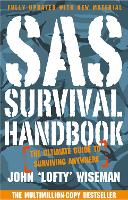


|
|
| book details |
SAS Survival Handbook: The Definitive Survival Guide
By (author) John ‘Lofty’ Wiseman

|
This book is currently unavailable. Enquire to check if we can source a used copy
|
| book description |
The original and best survival guide for any situation in every climate. Now with added techniques for handling Urban dangers, the ‘SAS Survival Handbook’ is the complete companion for adventurers everywhere. The original and best survival guide for any situation in every climate is back. Now with added techniques for handling Urban dangers, the SAS Survival Handbook is the complete companion for adventurers everywhere. From making camp and finding food in the wild to security and self-defence in the streets, be prepared in any city, land or sea. SAS legend John ‘Lofty’ Wiseman’s unrivalled multi-million copy bestseller will teach you: Preparation – Understanding and assembling latest, most resilient, kit. Navigation – Skills, technologies and techniques to get you through unfamiliar terrain. Food and Health – Finding resources in your environment, feeding yourself, healing yourself and avoiding disease. Urban Safety and Security – Recognising dangerous situations, defending yourself and saving others. Disaster Survival – Dealing with unstable environmental conditions: what to do in the face of flash flooding or fast-spreading fire.
| product details |
Normally shipped |
Publisher | HarperCollins Publishers
Published date | 4 Aug 2011
Language |
Format | Digital download
Pages | 576
Dimensions | 0 x 0 x 0mm (L x W x H)
Weight | 0g
ISBN | 978-0-0073-7442-7
Readership Age |
BISAC | sports & recreation / outdoor skills
| other options |
|
|
|
To view the items in your trolley please sign in.
| sign in |
|
|
|
| specials |
|
An epic love story with the pulse of a thriller that asks: what would you risk for a second chance at first love?
|

|
Mason Coile
Paperback / softback
224 pages
was: R 520.95
now: R 468.95
|
A terrifying locked-room mystery set in a remote outpost on Mars.
|
|
|
|
|
|